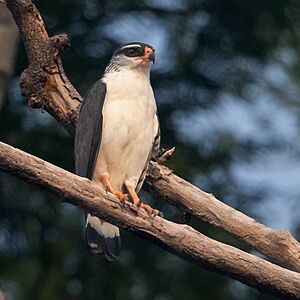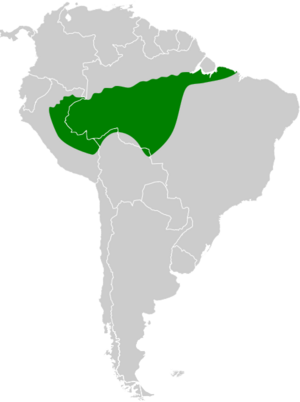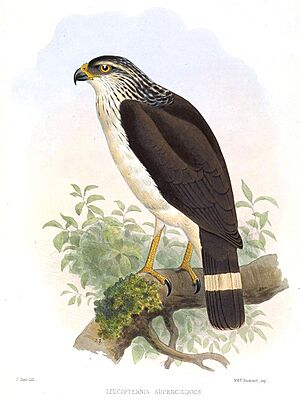White-browed hawk facts for kids
Quick facts for kids White-browed hawk |
|
|---|---|
 |
|
| Conservation status | |
| Scientific classification |
|
| Kingdom: | Animalia |
| Phylum: | Chordata |
| Class: | Aves |
| Order: | Accipitriformes |
| Family: | Accipitridae |
| Genus: | Leucopternis |
| Species: |
L. kuhli
|
| Binomial name | |
| Leucopternis kuhli Bonaparte, 1850
|
|
 |
|
| Script error: The function "autoWithCaption" does not exist. | |
Script error: No such module "Check for conflicting parameters".
The white-browed hawk (scientific name: Leucopternis kuhli) is a type of bird of prey. These birds are often called "true hawks." They belong to the Accipitridae family. You can find them living in countries like Bolivia, Brazil, and Peru.
Contents
About the White-browed Hawk Family
Scientists group animals together based on how they are related. This is called taxonomy. The white-browed hawk is closely related to the black-faced hawk. Sometimes, people even thought they were the same species!
Both of these hawks belong to the same group, called Leucopternis. Another bird in this group is the semiplumbeous hawk. The white-browed hawk itself does not have different types or subspecies.
What Does the White-browed Hawk Look Like?
The white-browed hawk is about 37 to 40 centimeters (15 to 16 inches) long. Its wings can spread out from 65 to 76 centimeters (26 to 30 inches). Female hawks are a bit bigger than males. Both male and female hawks look the same.
They have a dark head with a thin white stripe above each eye. Their upper body is black. You might see white streaks on their neck and back. Their tail is black with a wide white band in the middle. Their belly and chest are white. Their eyes are brown or reddish-brown. Their beak area (called a cere), legs, and feet are orange.
Where Do White-browed Hawks Live?
You can find the white-browed hawk south of the Amazon River. They live in eastern Peru, in areas like Loreto and Madre de Dios. They are also found in northern and northeastern Bolivia. In Brazil, they live all the way to the Atlantic coast in Pará state.
These hawks make their home in tropical rainforests. They usually live in areas from sea level up to about 500 meters (1,600 feet) high.
White-browed Hawk Behavior
Movement
The white-browed hawk seems to stay in one place. It does not appear to migrate or move long distances.
Feeding Habits
The white-browed hawk hunts close to the ground in the forest. Scientists have not studied their diet much. However, people have seen them catch snakes and lizards. They likely also eat frogs and large insects.
Reproduction and Life Cycle
We do not know much about how white-browed hawks raise their young. One nest was found in western Brazil in December. Scientists thought it held eggs.
The nest was a small platform made of sticks, twigs, and leaves. It was placed about 15 meters (49 feet) high in the trees. It was located just below the main treetop canopy.
Vocalization
The white-browed hawk makes a special sound. Its call is a high-pitched, thin whistle. It sounds like "keeeeuw" and is given every so often.
Status of the White-browed Hawk
The IUCN (International Union for Conservation of Nature) has looked at the white-browed hawk. They have listed it as a species of "least concern." This means it is not currently in danger of disappearing.
The hawk lives across a large area. However, we do not know how many white-browed hawks there are. Scientists believe their numbers might be going down. No immediate dangers have been found for them. Even though we don't know much about this bird, a lot of its forest home is still safe. Because of this, it is not seen as a bird that needs immediate help.
 | Selma Burke |
 | Pauline Powell Burns |
 | Frederick J. Brown |
 | Robert Blackburn |



